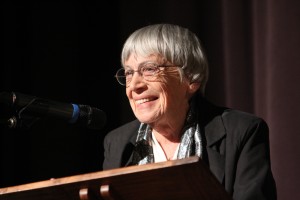Updated January 2018 after her passing. She will be greatly missed.
“When you light a candle, you also cast a shadow.”
She was one of my all-time favorite authors, but I totally admit...her books are dense and can be hard to get into. You've probably heard her name mentioned among the lists of science fiction and fantasy greats. Here are her most intriguing and popular books, to get you hooked.
The Left Hand of Darkness and The Dispossessed are the most famous of her Hainish series (which comprises many volumes ranging from mediocre to sublime, and can be read in any order). They're high concept sci-fi, centered around big, fascinating ideas. The Left Hand of Darkness imagines an androgynous world where everyone's gender cycles as frequently and unremarkably as a menstrual cycle. The Dispossessed is about an idealistic moon colony of anarchists, orbiting the decadent capitalist world it seceded from, and an astrophysicist caught in between the two worlds.
The Lathe of Heaven isn't part of a series, but also stars a killer concept: what if one ordinary man's dreams could change the whole world's reality, and what if his unscrupulous psychiatrist took advantage of that fact?
Gifts is the first volume of her newer fantasy series, The Annals of the Western Shore. It's not as popular as her classic Earthsea books (I'll get to those next!), but I think it's more accessible for first-time Le Guin readers (and it'll appeal to fans of YA fantasy series like Graceling and The Girl of Fire and Thorns, too!). The premise feels like a familiar folktale: families have hereditary magical powers, which affects both politics, and day-to-day life. Each book in the series focuses on big moments in the lives of different teenagers in different parts of this imaginary land.
Now then. Her Earthsea series is one of the best fantasy series ever written. Dragons, check. Magic, check. Epic journeys through mysterious archipelagos, check. Trapped in sinister catacombs, check. I have to wonder what modern fantasy would be like, if more authors took her books to pay tribute to, rather than Tolkien's. Don't make any assumptions about the characters based on their race and gender, for starters. It's also kind of a meta commentary on the nature of writing itself: in her system of magic, it's names that have power. I'll warn you, they're a little slow-moving to get into, but well worth the effort. Start with A Wizard of Earthsea (or do what I did as a kid, put it down for a little while and read The Tombs of Atuan first, which was easier for me to get into because of the female main character and dark, creepy setting). But whatever you do, don't watch the execrable miniseries -- I usually like watching movies before reading the book (library heresy, I know!), but it was a really generic adaptation that lost everything unique about the series. (And hey, her opinion was even worse!)
"When I saw the script, I realised that what the writer had done was kill the books, cut them up, take out an eye here, a leg there, and stick these bits into a totally different story, stitching it all together with catgut and hokum."
Her short stories are also amazing, and a quick way to sample the broad scope of her work. The Unreal and the Real and The Unreal and the Real are two volumes of her absolute best. The Wind's Twelve Quarters is my favorite collection, though.
If nonfiction's more your thing, try Steering the Craft, a book about writing that will appeal to fans of Stephen King's On Writing, and The Wave in the Mind, a new collection on reading and writing that will introduce you to her formidable essay skills.
P.S. Once you're a Le Guin fan, I highly encourage you to seek out one of her more esoteric books, Always Coming Home, via your favorite bookstore, or by suggesting that the library buy it, or borrow it. It's basically a faux-anthropology of the future, with character studies interwoven between myths, legends, songs, poems, and sketches of pottery. It also painfully / hopefully recalls her family's morally ambiguous history with anthropology: her father studied, and arguably exploited, a member of the Yahi tribe of Northern California who had refused to move to a reservation. Her mother wrote the heartbreaking Ishi in Two Worlds about Ishi, and their family's, story.


